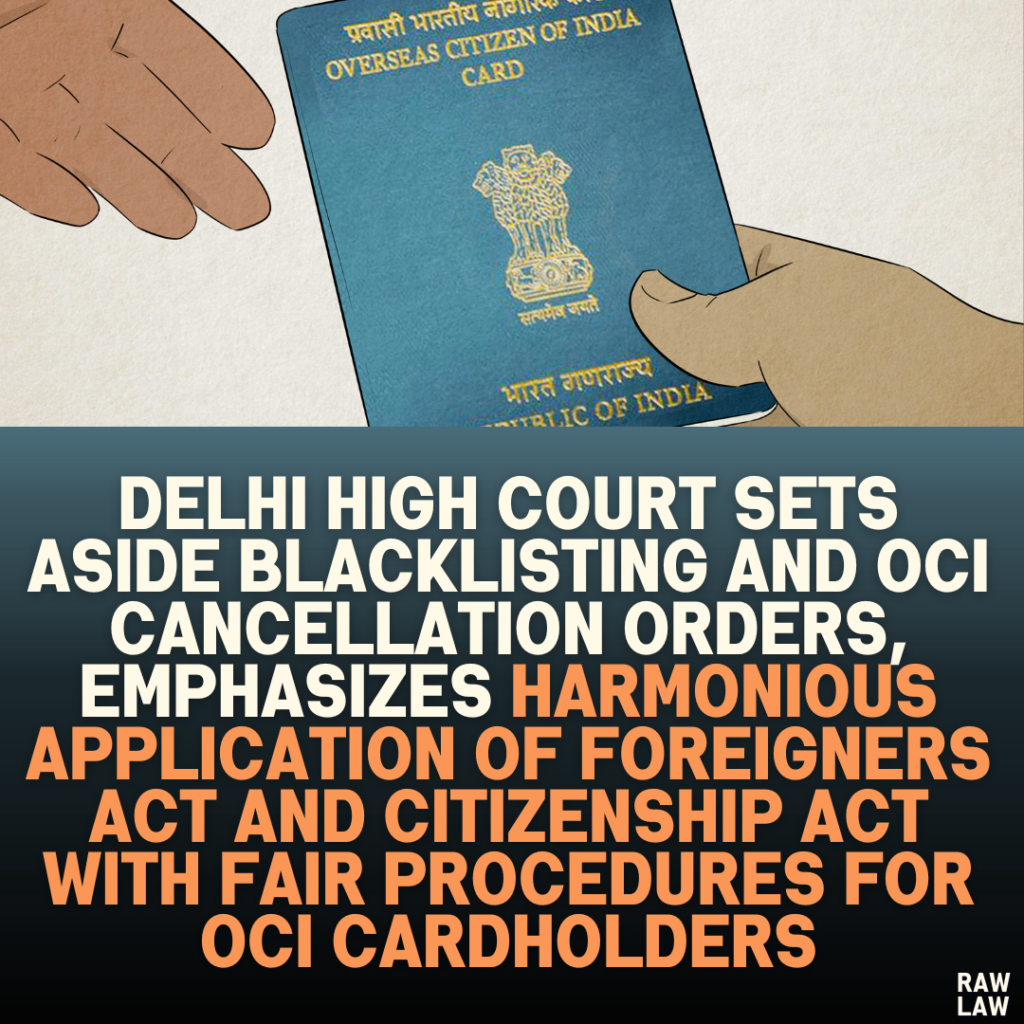Court’s Decision:
The Delhi High Court reviewed two orders against the petitioner, an Overseas Citizen of India (OCI) cardholder and U.S. citizen, relating to the cancellation of his OCI card and a blacklisting order barring him from entry into India. The Court ruled that both orders failed to meet the principles of natural justice as required under Section 7D of the Citizenship Act, 1955. It directed that a new show cause notice must be issued with clear grounds for the proposed actions, granting the petitioner an opportunity to respond.
Facts:
The petitioner, an 80-year-old OCI cardholder residing in the U.S., sought entry to India to visit family. His OCI card was canceled in May 2023, with a subsequent blacklisting order barring his entry. The orders alleged his involvement in activities prejudicial to India’s interests. The petitioner challenged these orders, contending that they violated his rights as an OCI cardholder and were issued without due process.
Issues:
- Applicability of the Foreigners Act to OCI Cardholders: Whether an OCI cardholder, though legally a foreigner, is entitled to procedural safeguards under the Citizenship Act for actions such as cancellation and blacklisting.
- Compliance with Principles of Natural Justice: Whether the vague allegations in the show cause notice and lack of specific evidence allowed sufficient opportunity for the petitioner to defend against the charges.
Petitioner’s Arguments:
- Right to Natural Justice: The petitioner argued that both the cancellation and blacklisting orders lacked transparency and procedural fairness, as no specific allegations or evidence were provided.
- Special Status of OCI Cardholders: He contended that OCI cardholders are distinct from regular foreigners, meriting additional procedural safeguards akin to those of citizens.
- Violation of Statutory Provisions: The petitioner emphasized that Section 7D of the Citizenship Act mandates a hearing before adverse actions, which was not observed.
Respondent’s Arguments:
- Sovereign Authority Over Entry: The government contended that under the Foreigners Act, India retains absolute discretion to restrict entry to any non-citizen deemed a security risk, even if an OCI cardholder.
- Classified Information: Respondents asserted that the allegations were based on intelligence inputs which could not be disclosed for national security reasons, supporting the cancellation and blacklisting orders.
Analysis of the Law:
The Court examined both the Citizenship Act and the Foreigners Act. It held that although OCI cardholders are defined as foreigners, the Citizenship Act grants them certain privileges and procedural safeguards. The principles of natural justice, inherent to Section 7D, require that cancellation of OCI status must involve specific grounds and a clear opportunity for response.
Precedent Analysis:
The Court referred to Anushka Rengunthwar v. Union of India, which described OCI status as a “midway right” between citizenship and foreign status, affirming the need for procedural fairness. It also invoked rulings establishing that procedural safeguards apply even in cases involving national security.
Court’s Reasoning:
The Court reasoned that applying both the Foreigners Act and the Citizenship Act harmoniously is essential to uphold the legislative intent and protect OCI cardholders’ rights without undermining national security. It underscored that any action affecting OCI cardholders must meet the standards of reasonableness and fairness.
Conclusion:
The Court set aside the blacklisting and OCI cancellation orders, requiring a fresh issuance of a show cause notice that satisfies natural justice principles and provides specific grounds for proposed actions.
Implications:
This decision reinforces the procedural protections for OCI cardholders, emphasizing the need for clarity and specificity in government orders affecting their status. It underscores that even national security considerations do not preclude the fundamental right to a fair hearing.



